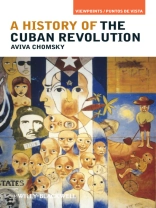A History of the Cuban Revolution presents a concise
socio-historical account of the Cuban Revolution of 1959, an event
that continues to spark debate 50 years later.
* Balances a comprehensive overview of the political and
economic events of the revolution with a look at the
revolution’s social impact
* Provides a lively, on-the-ground look at the lives of ordinary
people
* Features both U.S. and Cuban perspectives to provide a
complete and well-rounded look at the revolution and its
repercussions
* Encourages students to understand history through the
viewpoint of individuals living it
* Selected as a 2011 Outstanding Academic Title by CHOICE
Mục lục
List of Illustrations viii
Series Editor’s Preface x
Acknowledgments xii
Introduction 1
Talking about Freedom 2
Scholars Weigh In 4
Why Revolution? 6
Comparing Capitalism and Socialism 9
Latin American Attitudes 14
1 Cuba through 1959 18
Colonial History 18
The Colony in the Republic 25
Revolution: A War, or a Process? 34
2 Experiments with Socialism 44
Analyzing the Situation: Economic Backwardness 45
The 1960s: Experimentation and the Great Debate 48
The 1970s: Institutionalization and the Soviet Model 55
Democracy: U.S. and Cuban Style 56
Cuba in the 1970s: How it Worked 57
1986: Rectification 61
How Democratic was Cuban Socialism? 62
3 Relations with the United States 65
The United States and Cuba 66
In their Own Words: U.S. Policymakers Respond to Revolution
69
Covert War: Up to the Bay of Pigs 76
Covert War: After the Bay of Pigs 79
The Missile Crisis 82
After the Missile Crisis 85
The War Continues 86
4 Emigration and Internationalism 91
Miami 94
Cuba’s Global Reach: Beyond the Cold War 97
Cuba and Black Internationalism 98
Cuba in Africa and Latin America 100
Civilian Aid Missions 103
5 Art, Culture, and Revolution 106
Literature 110
Film 116
Music 120
Sport 122
Dance 125
Political Culture 126
Food 131
6 Cuba Diversa 134
Race 135
Gender 141
Sexuality 144
Religion 149
7 The ‘Special Period’: Socialism on One Island
153
1993-95: Rapid-Fire Reforms 154
Social Impact of the Market Reforms 157
Limits to Capitalism 159
Charting New Territory 162
Contradictions: Inequality and Jineterismo 164
Opting to Leave: The 1994 Exodus 168
Debate and its Limits during the 1990s 171
8 Cuba into the Twenty-First Century 176
From Perfeccionamiento to Recentralization 177
Civil Society into the New Century 183
Disillusionment 186
Bush-Era Policies 188
Cuba, Venezuela, and the ALBA 189
Cuba after Fidel 190
Conclusion 193
Notes 196
Bibliography 214
Index 228
Giới thiệu về tác giả
Aviva Chomsky is Professor of History and Coordinator of Latin American, Latino and Caribbean Studies at Salem State College in Massachusetts. Her previous books include Linked Labor Histories: New England, Colombia, and the Making of a Global Working Class (2008), winner of the New England Council of Latin America’s Best Book Prize, They Take Our Jobs! And 20 Other Myths about Immigration (2007), and West Indian Workers and the United Fruit Company in Costa Rica, 1870-1940 (1996).












